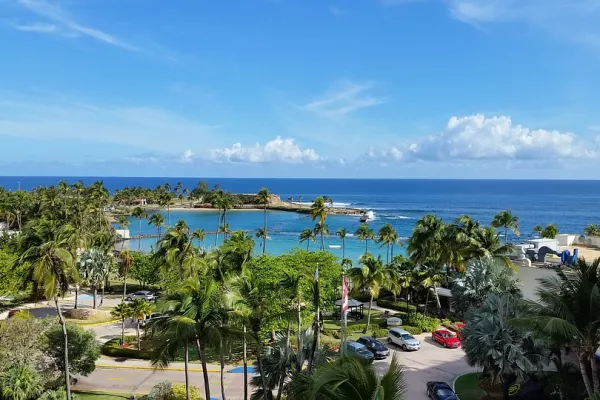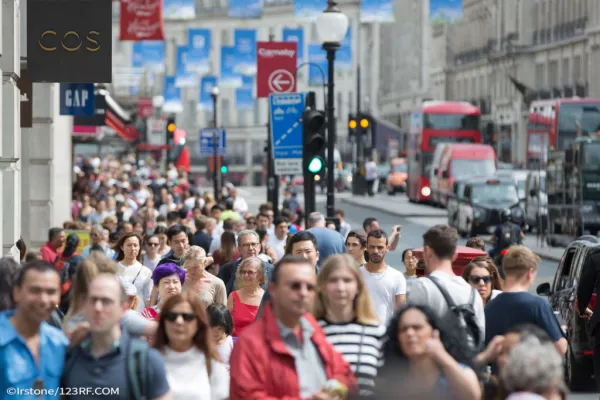Aliana Acevedo isn’t collecting a paycheck, because the Ritz-Carlton hotel in San Juan, Puerto Rico, is shut indefinitely. She’s trying to get a job with the Federal Emergency Management Agency, a lifeline for the battered island’s tourism industry in more ways than one.
More than 13,000 federal government workers who were dispatched to Puerto Rico for hurricanes Irma and Maria are filling the open hotels –- sometimes three to a single room. For those that remain shuttered, the agency is giving idled employees hope until tourists return to the U.S. territory’s beaches, rain forests and colonial Spanish beauty.
“I just need a job,” said Acevedo, 25, a waitress at the hotel’s Mares restaurant, explaining that she had only $800 in cash. “It’s making me anxious. I’ll do whatever. ”
The recovery after this year’s devastating hurricane season, which is already a slow period for hotels, is providing a welcome, if temporary, boost for a tourism industry worried about its future. The federal government’s hotel reimbursement rate of $167 a night in San Juan, which rises to $195 during high season, can last only so long. FEMA deployments are typically for 30 days, though they can be extended.
Hurricane Harvey’s aftermath gave Houston’s hotels a similar boost. They went from being the worst performers through July this year to leading the nation in occupancy and revenue growth since the cyclone made landfall Aug. 26.
In Puerto Rico, federal personnel are staying not only in hotels, but on cots at the convention center, in sheds and on ships. The work force is still swelling.
On Sunday, Rosario de Liriano spent her day stopping people on the streets of Fajardo who looked like they might work for FEMA in hope of landing a job. Before the storm, she owned a small business on the island of Vieques. She came to Puerto Rico’s northeast corner because she thought she’d have a better chance of tracking down information.
Such job-seekers have shaped the agency’s workforce for years. “Many FEMA employees started as local hires in their own states following a declared disaster,’’ Corey Coleman, a FEMA officer, wrote in an email.
‘All Gone’
The jobs are needed more than ever. Tourism in Puerto Rico is almost “all gone, certainly, through the first quarter, if not the first half of 2018,’’ said Martin Rapp, a senior vice president at Altour International Inc., a New York travel agency.
Bookings to Puerto Rico are down about 20 percent since hurricanes Harvey, Irma and Maria began in late August, said Donna Cheek, an agent with Bentley Hedges Travel in Oklahoma City. “We do a lot of cruise business and people are concerned about whether or not Puerto Rico is going to be a port of call for them,” Cheek said.
The drop-off comes amid a broader economic crisis. Puerto Rico in May sought protection from creditors in the largest insolvency of any U.S. municipality, $74 billion. The situation has been deteriorating since 1996, when the repeal of a corporate tax break caused manufacturing and investment to decline and younger people to leave the island. Average weekly wages in Puerto Rico are about half the U.S. average, according to the Bureau of Labor Statistics.
GDP Driver
Travel and tourism, much of it from the U.S. mainland, contributes about 3 percent of Puerto Rico’s gross domestic product and employs about 21,000 workers, according to the World Travel & Tourism Council in London. Together with indirect benefits, such as investment spending and domestic purchases by businesses dealing with tourists, the impact is about 8 percent of GDP, the lowest among the Caribbean islands.
The island became a destination for Americans with the 1949 opening of the Caribe Hilton Hotel. It was the first Hilton property outside the continental U.S. and -- at least according to its website -- the birthplace of the pina colada.
Hilton Worldwide Holdings is continuing to pay workers at its Puerto Rican properties until business insurance kicks in, spokesman Nigel Glennie said. McLean, Virginia-based Hilton employs about half the roughly 3,400 people who work at its nine properties; the rest work for third-party management companies.
“Although our Puerto Rico properties are not currently accepting new reservations, there remains plenty of work for our team members to do,’’ including gathering donations, packing food and water being delivered by barge, and tending to emergency personnel, Glennie said.
Storm Survivors
About 600 people from FEMA, the FBI, the Red Cross and other organisations have been staying at the Wyndham Grand Rio Mar Beach Resort & Spa in Rio Grande, an hour’s drive from San Juan along the coast. Having escaped serious structural damage, the most pressing problem has been cleaning up water seepage, said general manager Nils Stolzlechner.
Because of the arrival of relief workers, the resort, which is running on generator power, has remained at 100 percent staffing.
“Generally speaking, we’ve been very lucky,” Stolzlechner said. Nine holes of the golf course should be open by Saturday, with the other nine back in business about three weeks later.
On Tuesday afternoon, it was possible to linger in the resort’s Margaritaville vacation club and encounter few signs of distress. A small cadre of off-duty workers sat at the fully stocked tiki bar and watched about a dozen people swim in the pools on either side, most of them guests who endured the storm and hadn’t secured an exit from the island.
“I’m extremely hopeful we’ll have a strong winter,’’ though rebuilding the power grid and other long-term economic challenges remain, said Stolzlechner. “Tourism will be okay. It’s just all the other stuff.”
News by Bloomberg - edited by Hospitality Ireland









